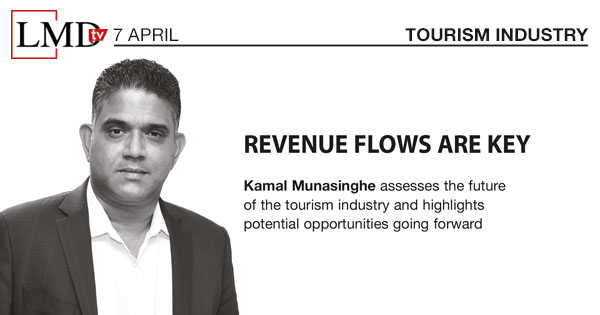LMD TV
The General Manager of Cinnamon Grand and Cinnamon Lakeside Kamal Munasinghe noted that “the tourism industry reacts very quickly to global situations,” adding: “Following the pandemic’s emergence last year, we witnessed cancellations and people delaying their travel plans from January.”
 He recounted: “With the travel restrictions in different countries, the industry came to a standstill. For Sri Lanka, the impact began in 2019 with the Easter Sunday attacks so we have experienced two years of continuous problems with tourist arrivals.”
He recounted: “With the travel restrictions in different countries, the industry came to a standstill. For Sri Lanka, the impact began in 2019 with the Easter Sunday attacks so we have experienced two years of continuous problems with tourist arrivals.”
However, the effects of the pandemic have been far-reaching compared to the 2019 attacks as travel came to a halt. Munasinghe estimates that about three million people’s livelihoods have been affected as a result.
In his assessment of the impact of health and safety requirements on the industry, he highlighted the importance of reevaluating the ongoing situation, which the Sri Lanka Tourism Development Authority (SLTDA), Ministry of Health and Ministry of Tourism have been doing, and easing regulations based on developments.
“There were very strict protocols in place but they’re being relaxed gradually, which is helping the industry move forward,” Munasinghe acknowledged.
As the tourism industry looks to bounce back, he believes that leisure travel will recover first: “People have been stuck behind closed doors in their homes or rather, in their countries. There’s a need to travel.”
Despite this, he is mindful of the fact that incomes across the world have been impacted over the last 18 months or so. As such, the industry should be targeting high spenders who are likely to be able to travel before others.
In contrast, businesses have adopted new technologies during this period. Munasinghe commented: “There have been many developments, which businesses will continue to use until there is a real need to travel to a destination.”
Having said that, meetings, incentives, conferences and exhibitions (MICE) travel may recommence as early as the end of this year – to this end, he revealed that the industry has been receiving inquiries from organisations across the globe.
The markets that Munasinghe says Sri Lanka should focus on for business travel are India, China, the UK, Central Europe, the US and Australia. He also views the country’s travel bubble concept positively, stating it is a good move that puts Sri Lanka ahead of others.
Munasinghe elaborated: “With COVID-19 vaccines being rolled out, we’re hearing positive things about international travel resuming. We are ready for that moment – we’ve done tests and trials, and identified the gaps, and have the advantage as a tourism destination in the region that will be open and welcome guests earlier than others.”
Commenting on the revenue earning operations of hotels, he highlighted rooms, and food and beverage, as the main contributors. However, these avenues of revenue aren’t sufficient to sustain operations, in his opinion.
“We could look into laundry, delivery, catering and so on but these would not be enough to sustain businesses in the long term,” Munasinghe explained, noting that while they could help with cash flows, they would not become the main drivers.
As such, for hotels seeking new streams of revenue, he cited the importance of enhancing their products and services so that premium prices can be demanded when guests begin visiting the country.
“This should be our focus as an industry going forward because it’s where we can make a difference in the region,” he said, adding: “If we can deliver authentic experiences, this is where the opportunity lies to earn more revenue.”
When it comes to his views on the industry returning to its pre-COVID performance, Munasinghe stated this could happen in 2023, citing industry experts.
He concluded: “We will begin seeing traction as soon as the next two months with the new regulations in place for arrivals in Sri Lanka.”



